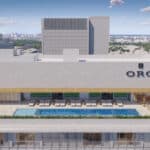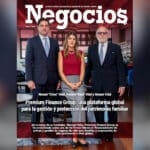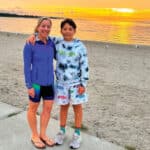Fernando Torres and Emilio Buitrago were our guests to talk about TPS: Fit like a glove. The acronym reveals the “Temporary Protected Status” recently received by Venezuelans in the United States. Somehow we felt comfortable in the world of sayings.
The topic is cheerful in general terms, but it becomes tense when Caracas is included in the big picture. In an unexpected way, Buitrago broke the dense mood. He spoke of “Venezuelanisms” (Venezuelan idioms.) A sardonic laugh burst out. We saw that at the benefit gates there will be “foxes and chameleons”. The status will be usedo for the persecuted and also will serve as a protective cover for the “enchufados (plugged-in) -exiled” Chavistas living in the United States.
Casa de Venezuela Philadelphia is part of a group of 47 Venezuelan organizations lobbying in Washington. The combined efforts of these persuaders helped the Biden administration, through the Executive branch, fulfill his election promise. “In the tri-state area of our zone of influence there are at least 12,000 Venezuelans.” Between Southern New Jersey, Delaware and Pennsylvania, “80% of those Caribbean nationals are considered refugees.” TPS has become a relief for them.
You can read:María del Pilar: The voice of the Latino community in Philadelphia
Fernando Torres is president of Casa de Venezuela Philadelphia and Emilio Buitrago one of its founders. None of them showed surprise to know that according to “Transparency International” Nicolás Maduro’s government is the most corrupt in America. In 2021, it ranks fifteenth in the world. Doña Barbara’s land is measured with a scale in which “zero” represents the corrupt champion and 100 the governmental neatness.
TPS: “Fit like a glove”
Our interviewees have more than twenty-five years as Philadelphia residents. They have lived in Pennsylvania’s main metropolis since the times when Hugo Rafael Chávez Frías was just a presidential aspirant. In those days, the man from Sabaneta (a town in the plains of western Venezuela) was already a coup leader and his name resounded even in Oslo, Norway. However, there were no certainties from the ideological point of view. He was “neither fish or fowl”.

Fernando Torres came to the United States when he was 15 years old. Photo Susan Calle“Casa de Venezuela was created in 2004,” said Emilio Buitrago, one of its founders. “It was born as an initiative inspired by a great visionary, Victor Garcia Crespo, who was its first president.”
Fernando Torres shows up in 2015. Soon after, he became president of Casa de Venezuela. His challenge was to “find ways to help Venezuelans who were just arriving. At the same time to raise awareness about the humanitarian crisis that was taking place in Venezuela. The more people knew about the crisis, the better we could help the Venezuelans there and those who were arriving.”
Fighting in Philadelphia
The Temporary Protected Status was conceived as part of a strategy. According to Fernando Torres, this is how the struggle was meant to be. He came to the U.S. when he was only 15 years old and today he knows how things work.
“TPS was not requested directly. We decided to raise awareness first. TPS: Like Fit like a glove is the title of a well-spun piece of work. “We reached out to city, state and congressional leaders; at every level of the country. Here in Philadelphia all three states, between New Jersey, Delaware and Pennsylvania, began to raise awareness. Events were held through West Chester University, the University at Delaware. Through the city, the mayor lent us City Hall to do an event: Same with Temple University. The idea was to start raising awareness of the humanitarian crisis. One of the nice things about the American sentiment is that when someone is suffering, usually Americans in general want to help.
“Then it went to phase two and two officials started asking what they could help with. We asked for two things: TPS for Venezuelans. The second thing was immigration reform. Similar to what happened with the Cuban community in the 1980s. Phase three will be how to legalize them in the long term. But for now we must celebrate the arrival of TPS. It was a big process and the truth is that the first congressman who offered us his hand was Brendan Boyle. He was the first one who signed up for the Foreign Affairs Committee of Congress and through that committee he helped us open the doors to the rest of our officers”.
Venezuelan pride
The Venezuelan immigrant, the one who arrived massively to the United States, is of recent date. A first wave was brought by the “tragedy of Vargas,” recalled Emilio Buitrago. The second great wave arrived with the hope killed in the streets. It swelled after the protests against Maduro sketched his dictatorial face. The middle class watched their children’s future slip through the fingers of inflation. The less privileged were sentenced not to dream. They were forced to watch as spectators in a coliseum as the basic industries were killed. And the old people, as well as the value of their pensions, went weak. There is no need to do the math, but the 1940 generation is almost extinct.

You can read: Joanna Otero Cruz: “We have a lot of work to do with our Latino families”
Fernando Torres pointed out that they are proud of their origin. “We set up a message of awareness. In English it says: “We’re here to give not to take”. The slogan expresses the character of the Venezuelan community . “We are in the United States to give. We have doctors, architects, engineers, a community which differs from the traditional Latino community. We want to use our knowledge to help other Latino communities. The more we can come together the better we will be as Latinos. We want to project that intention; we want to help raise awareness that the Latino community is powerful.”
Destruction keeps on
TPS is a summer sun for Venezuelans in the United States. TPS: “Fit like a glove” is not a random title. Following the trend of Venezuelan idioms, more than one chavista “no pelará ese boche” (won´t miss the opportunity.)
The evil root is still in Venezuela. According to Fernando Torres, Maduro´s source of resources comes from drug trafficking. “There are two sources through which money still enters Maduro’s government. One, we call ‘the ‘enchufados’. The other comes from Colombian cartels drugs trafficking. They are the ones who distribute it to the world via Venezuela. There is a lot of money coming in. There is also an oil sector that has not been completely stopped. It is giving a lot of money to the dictator Maduro and all the “enchufados” as we say in Venezuela.
Translated by: José Espinoza


































 Noticias Newswire
Noticias Newswire









